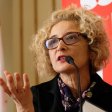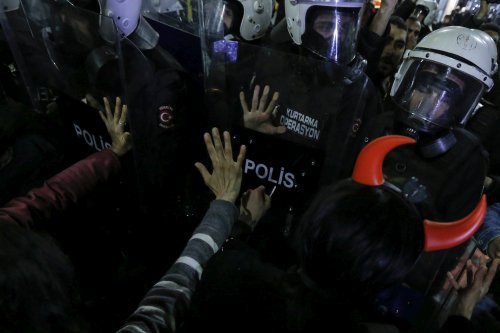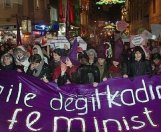* Photograph: Hikmet Adal - bianet
The institutionalization of the new regime has been facilitated by the accompanying modifications in the mode of patriarchy. As the regime transformation involves niches - those moments when and – where the feminist initiatives could manipulate for gender equality, the ruling AKP resorted to increasingly aggressive measures to monopolizing its institutional power. The fact that the last phase witnessed also the disruption of the alliance between the party and the Gülen community – one of the strong supporters of the AKP rule – contributed to the rather sharp rise in the party's aggressive authoritarianism. [10]
The first decade of the 2000s can be considered as the period when the transformation in the structure, working of, and the supporting rhetoric for, the public order has accelerated. The transformation process had already started in the late 1970s, and unfolded through the 1980s and 1990s (Balkan and Savran 2002). It was marked by the neoliberal order of things, hosting centrist politics as the common platform for the governing political actors. [11]
In this unfolding, Gezi Resistance marks a decisive point both in terms of Turkey's experience with neoliberal politics and the AKP's place on the political spectrum. Thus, it marks the final stage of the regime change, where the country is experiencing the demise of the secular Republican regime.
In observing the current regime change, I start from the contention that this phase does not define an idiosyncratic turn, inviting an exceptionalist frame to explicate its basics. Defining the state of affairs in Turkey exceptional risks adding up to the official registry of exceptional times, and undermining the pattern of socio-political transformation in the past four decades.
1980 military coup d'état laid its origins, and the following military interim regime (1980-1983) already framed the fascistic route that would surface in times when the ruling blocs opted for emergency rules to pacify socio-political opposition – in the late 1980s, 1990s, and most recently, between 2016 and 2018. [12] The military interim regime was functional in signing off the socio-political opposition. This was accomplished by the containment of opposition via massive imprisonments, torture and death penalties. The members of the political parties, active in the past decade as well as those who were active in alternative socio-political movements were banned from political activity for almost a decade. The narrowing down of the political space eased the process of excluding the accumulated oppositional experience of the 1960s and 1970s from the political scene. This was especially the case for the left (Atacan 2005).
1980s also witnessed the rejuvenation of an independent feminist movement in the country (Sirman 1989). This development in the second half of the decade is certainly linked to the early-republican feminist attempts, as well as to the women's activism in the leftist organizations in the 1970s. The movement first took shape in a rather gradual, silent and low-profile style, waiting until the march against violence against women in 1987 to have public visibility. This was the first mass demonstration after the coup d'état. It was controversial for an independent feminist movement to emerge in the authoritarian milieu of post-coup politics. It hinted at the feminist strategies that would be pursued in the coming decades while also marking the hardships that would be encountered by the feminist organizations, especially in the last phase of regime change.
This dialectic – counterbalancing of authoritarian rule by the rise of feminist politics – is important for understanding the current mode of patriarchy. Considering this dialectic is also important to set in place the seemingly contradictory practices of the AKP governments that sometimes resonate with women's rights-based demands, while most frequently dismissing feminist claims. The persistence of feminist rights-based claims, despite authoritarian measures, ties to the repressive turn in the AKP's governing methods, especially since 2013 Gezi Resistance.
The institutionalization of the new normals in Turkey's politics has been pursued along four layers: The first layer relates to the dissolution of the social into the familial and the individual. The second layer is observed in the restructuration of the decision-making procedure that incapacitated the parliament, endowing the executive in the person of the President with broad powers. The securitization of socio-economic and political spheres forms the third layer. The last layer hosts a contentious development – Islamization of the norms of the connection between the ruler and the ruled.
All these four layers are interconnected. The dissolution of the social refers to the dismissal of rights claims to public services – especially in the case of social security, health insurance, retirement rights – and the redefinition of these rights claims (e.g., the right to work) in individualized terms—i.e. all those rights that are deemed to relate to citizenship are transferred to individualized responsibilities. [13]
For example, the amendment of the Labor Law (2003) in the first term of the AKP government signified the tendency to design the labor market in line with the notions of workfare and flexibility. It also tried to establish a legal structure that would curb the possibilities for opposition to the transformation of work life (Adaman, Buğra, İnsel 2009; Buğra and Yakut-Cakar 2010; Dedeoğlu 2009). Another example is the new legal arrangements for social security and public services. The new legal regulations recognize the state's responsibility to contribute to the individual social security schemes while putting in place mechanisms that ensure the integration of the workers in the informal sector within the scope of social policies.
The new legal structure also brings in the privatization-cum-individualization of social security in particular, and of public services in general. Public services are turned into commodities in this process. For instance, while the AKP has claimed that the standardization of social security schemes would result in equality, the new social security model was based on pay as you go system (Buğra 2018; Buğra and Keyder 2006).
The new legal arrangements also rely on a religio-familialistic discourse that envisages Turkish family as an ideal locus for social solidarity – thus, turning a matter of social rights into a subject of intimate sphere (Coşar and Yeğenoğlu 2011). Alongside this familialism runs an emphasis on the notion of charity, reminiscent of the early years of the Republic.
The difference between the Republican and AKP's Islamic form of charity resides in the calls to citizens. In the former, citizens of the nation-state were direct addressees of the call; they were called into good citizenry as a matter of good humanness on this earth, with a slight implication for secular ethics. In the latter, the call involves religio-communitarian liabilities. Shortly, the AKP's conservative neoliberalism, embroidered with Islam, is reflected in the sphere of social policymaking through individualization of rights-based discourse, family and charity (Atalay 2017).
The second layer – the restructuration of the decision-making procedure – can be observed at two interrelated levels: institutional and personal. The initial steps were taken in 2007 by the referendum that put the option of the election of the president directly by the people. By 2010 referendum, significant constitutional amendments were approved by the majority of the voters. Lastly, by April 2017 referendum, the transition to presidential governing system was approved. The changes incapacitated the parliament, endowing the executive in the person of the President with broad powers.
Here, certain points come to the fore: First, the reorganization of state structure was mostly managed by referenda and by decrees in force of law. The referenda have been used to that effect since 2007. The decrees in force of law were the main tools of decision-making during Turgut Özal's prime ministry in the second half of the 1980s. The AKP governments used the Özal model especially within the scope of state of emergency. The amendments basically eliminated the parliamentary checks on the executive, as well as the judicial review on the executive, and nullified the balance of power to the advantage of the executive.
These changes were further circumscribed by the transfer of executive power from the Council of Ministers to the personal rule of the president. In Turkey's new decision-making mechanism, there is no Council of Ministers. There are ministers directly affiliated to the president, nominated and appointed by him. In its current form, the president has personal control over main judicial organs, as the Constitutional Court and Higher Commission of Judges and Prosecutors (Grigoriadis 2018; Kalaycıoğlu 2014; 2012).
Personalistic politics is an asset of neoliberal order of things as they emerge in authoritarian and conservatizing settings. This has been the case in Turkey since the 1980 coup d'état. Throughout the decade, left without the main organizational tools (e.g., student organizations, political parties, and unions), the citizens were easily called into assuming personal roles that would cut across the familial, public, and market/places. On the part of the rulers, the style of addressing the people, the tune of the rhetoric were gradually transformed into one of an informal variety.
In the post-1980 era this style was mainstreamed, introducing new ways of linking the spaces of the familial, private, public and the state. Personalistic politics involved signing of solidarity from the political engagements, replacing the notion and its practice by politics, imaged in familial connections. The family in place is certainly the heteronormative one, the patriarch – the father – speaking his organic truth.
The third layer – the securitization of socio-economic and political spheres – can be traced to the coding of any phenomenon and measure in terms of national security, and justification of security measures via socio-economic benefits. The first axis of securitization is most manifest in policies that are related to women's employment and/or women's social benefits whose goal is to protect the family. In a rather contradictory parallelism, the familial sphere is presented as a place where individuals should seek security to endure the necessary insecurity in labor markets. This safe place-setting speaks directly to the presentation of the family as the main unit of solidarity in Turkish society. The second axis is observed in coding acts of social and political opposition in relation to terroristic activities, and/or the justification of rights violations on the grounds of national security.
One such instance can be observed in the perfunctory but working connections between opposition parties, their voters and terroristic activities ("Erdoğan İşaret Etti" 2018). Another example can be observed in Erdoğan's address to the business circles in the commemoration for the first anniversary of 15 July 2016 coup d'état attempt ("OHAL'den İstifade Ederek Anında Müdahale Ediyoruz" 2017):
".. and by the authority bestowed by our nation we implement even the state of emergency for the sake of our business circles, so that they can operate more comfortably. ... When we first came to power 15 years ago, there was also a state of emergency, but all factories were under the threat of strike. Now, thanks to the state of emergency, we immediately step into those places where there is the threat of strike. We say that, we do not allow strike here; for you cannot disrupt our business world."
The case of Peace Academics vividly illustrates the thread of desecuritization through securitization. Here, we see the precariarization of massive numbers of academics who opted for pacifist means to ask for peace in Turkey. The ruling circles immediately turned their pacifist claims into threats against national security. Thus, they immediately and thenceforth consistently violated the citizenship rights of these people for social security, including right to work, right to academic freedom, along with individual rights such as the right to movement, right to privacy.
In this respect, the case of Peace Academics evinces not only the rise in authoritarianism but also the fascistic track through which the regime change has been operated. The aggression in official rhetoric that targets the Peace Academics is symbolic of the aggression toward critical thinking that counters the institutional power circles ("Erdoğan: Sözde Akademisyenlerin Haddini Bilmesi Lazım" 2016):
"The mass that calls itself academics accuses the state. They do not suffice with that and invite the foreigners to Turkey. This is opting for mandate. ... Today, we face the treason of pseudo-intellectuals many of whom are paid by the state, who are public servants."
As for Islamization, it is hard to conclude that the AKP has pursued political Islam in its 15 year-long governing practice. The party has consistently denied that it embraced Islamist politics, while the leading members emphasized religion as a matter of individual belief. Likewise, in its first years, the AKP declared that it cut its ties with the National Outlook Movement – the main representative of the thread of Islamist political parties and their social extensions for more than five decades.
However, looking at three socio-spatial spheres one might observe a different performance of religious political preferences: National Education, Mosques and women's rights. As for National Education, one of the most recent examples is the omission of evolution theory from national education textbooks. Another one is the pervasion of Sunni-Muslim principles and values into the primary and secondary school textbooks. Likewise, AKP's prominent spokespersons have never refrained from explicitly acknowledging their prioritization of raising religiously conscious youth, and lately, "pious generations" with direct implications for the national education policies (Lüküslü 2016; Coşkun and Şentürk 2012; Türkmen 2009).
In terms of Islamization in everyday life a significant development can be observed in the aftermath of the 2016 coup d'état attempt when calls to prayer in the form of knelling persisted on a daily basis. These knellings were regulated by the DİB with the slogan "From the Coups that Silence the Calls to Prayer to Knellings that Silence the Coups". They exemplify the symbolic and material bond between the securitization discourse and the pervasion of the socio-political space by Islamist moralism. The knellings merged well with the discourse of national reconstruction and national liberation.
The discourse was first introduced visually in the 2014 presidential election commercials, as well as in Erdoğan's "balcony speech" after he was elected president. The campaign was imbued with Islamist sentimentalities and faith in Erdoğan's victory as the divinely designated president – "...Whatever they do is futile; there is a celestial verdict..." – ("Nation's Man" 2014, 1.24˝-1.30˝), [14] as well as recurrent references to the National Liberation War of 1919-1922. They also merged well with the construction of the righteousness of AKP's ruling through the personal sanctification of Erdoğan's leadership. Most representative in this respect is his account of an instance during 2016 coup d'état attempt ("Gençlerle Büyük Buluşma" 2017, 33:18˝ – 34:30˝):
"... they arrived Dalaman [Airport] before us. They investigated our airplane. But very interesting things happen... We learned later that they came and went. ... It was in ... Cave, wasn't it? That incident when they went to the cave, and our beloved Prophet is there ... But the spider spins the entrance of the cave; and as they approach the cave, they see that it is spinned. They conclude, "since it is spinned, most probably no one is around." And these polytheists [do not attempt to enter the cave] and turn back. And now, they came and look around, and as they cannot see anyone in the airplane they turn back and go. And after they leave, we get on our airplane..." [15]
After the coup d'état attempt the sanctification of Erdoğan's persona found its place in the claim to a new national liberation war, with a remarkable increase in the frequency and intensity of reference to enemies inside and outside the country. Thus, the theme of national liberation war as a recurring historical point of reference was brought into the present, inviting exceptionalism to ease the hands of the AKP governments to regulate the regime transformation. (SC/SD)
CLICK - Part 1: Regime Change in Turkey: Old Symbols into New Settings
CLICK - Part 2: The AKP's Gender Regime: Anti-Feminist Consistency
CLICK - Part 4: Naming the Feminist Stance
About Simten CoşarProf. Dr. Simten Coşar graduated from the Department of Political Science and International Relations of Boğaziçi University in İstanbul. She completed her Master's and PhD studies at the Department of Political Science and Public Administration of Bilkent University in Ankara. Her major subjects of academic interest are political thought, political thought in Turkey, political parties in Turkey and women in political thought. Her articles have been published on a series academic journals including the Journal of Political Ideologies, Contemporary Politics, Feminist Review, Journal of Third World Studies, South European Society and Politics ve Monthly Review. She has retired from the Department of Radio, Television and Cinema of Hacettepe University Faculty of Communication. |
Footnotes:
[10] Gülen Community is the Sunni-Islamist civil-cum-political network that grew out of the Nur movement in Turkey. The Community used to be a strong ally of the AKP until the dispute over the dershanes (private preparation schools for entrance exams at different levels of education), and then reached its zenith in December 17 and December 24 Corruption Cases (2013).
[11] For an analysis of centrist politics, as the defining political form at the level of party politics in post-1980 Turkey see Özman and Coşar 2007.
[12] Turkey's experience with systematized State of Emergency has marked the post-1980 period. It started with the Martial Law that was first partially initiated in 1978, and routinized by the 1980 military coup d'état. It was terminated in 1987. State of Emergency, applied in the greater part of Eastern and Southeastern regions, proceeded through the 1990s to last until 2002. And the latest turn would host extensions to the State of Emergency for seven times in two years. It is well documented that periods of State of Emergency host conspicuous human rights violations. See for example: http://www.ihd.org.tr/bugun-icinde-bulundugumuz-olaganustu-durumla-27-ekim-1983-tarihinde-yani-dogrudan-12-eylul-askeri-darbe-doneminin-bulend-ulusu-hukumetitarafindan-bizzat-darbeyi-pekistirmek-amaciyla-cikarilan-olag/ 2016.
[13] In their account of developmentalist discourse, defining one phase in the history of neoliberal order of things Patel and McMichael (2004) note the inegalitarian and repressive implications of the individuating conceptualization of social rights. They underline the counter-conceptualization of rights "...where the state remains a guarantor of rights, but where it plays no role in the authorship of those rights" (249). Two recent works on the making of the labor market in its formal and informal forms attest to the responsibilization of the unemployed and/or underclass in finding work, in making one eligible to the right to work. See Işıklı 2017; Dinler 2016.
[14] Alternatively phrased as "there is a plan beyond calculations; there is a trap beyond traps..." by Erdoğan in one of his campaign speeches. See https://www.youtube.com/watch?v=5pejR5Zp-jA 10.31˝
[15] In colloquial Turkish the pronoun "we" is sometimes used to connote "I" in personal accounts. Here Erdoğan talks about himself as "we".
References:
Adaman, Fikret, Buğra Ayşe and İnsel Ahmet. 2009. "Societal Context of Labor Union Strategy." Labor Studies Journal, 34 no.2:168-188.
Atalay, Zeynep. 2017. "Partners in Patriarchy: Faith-Based Organizations and Neoliberalism in Turkey." Critical Sociology, https://doi.org/10.1177/0896920517711488
Atacan, Fulya. 2005. "Explaining Religious Politics at the Crossroad: AKP-SP." Turkish Studies, 6 no.2:187-199.
Buğra, Ayşe and Yakut-Cakar, Burcu. 2010. "Structural Change, the Social Policy Environment and Female Employment in Turkey." Development and Change, 41 no.3:517-538.
Buğra, Ayşe. 2018. "Social Policy and Different Dimensions of Inequality in Turkey: A Historical Overview." Journal of Balkan and Near Eastern Studies, 20 no.4:318-331.
Buğra, Ayşe and Keyder, Çağlar. 2006. "The Turkish Welfare Regime in Transformation." Journal of European Social Policy, 16 no.3: 211-228.
Coşar, Simten and Metin Yeğenoğlu. 2011. "New Grounds for Patriarchy in Turkey? Gender Policy in the Age of the AKP." South European Society and Politics, 16 no.4: 555-573.
Coşkun, Mustafa Kemal and Şentürk, Burcu. 2012. "The Growth of Islamic education in Turkey: The AKP's Policies toward Imam-Hatip Schools." In Neoliberal Transformation of Education in Turkey, edited by Kemal İnal and Güliz Akkaymak, 165-177. New York: Palgrave Macmillan.
Dinler, Demet Ş. 2016. "New Forms of Wage Labour and Struggle in the Informal Sector: The Case of Waste Pickers in Turkey." Third World Quarterly, 37 no.10: 1834-1854.
"Erdoğan İşaret Etti: Parlamentoya Girsinler Diye Destek Verenler de Hesap Verecek." 2018. http://www.diken.com.tr/erdogan-isaret-ettiparlamentoya-girsinler-diye-destek-verenler-de-hesap-verecek/ August 4. (Accessed on September 1, 2018.)
"Erdoğan: Sözde Akademisyenlerin Haddini Bilmesi Lazım." 2016. https://www.bbc.com/turkce/haberler/2016/01/160111_erdogan_akademisyen_aciklama January 12. (Accessed on June 3, 2018.)
"Gençlerle Büyük Buluşma." 2017. ATV. April 11. https://www.youtube.com/watch?v=XeXrtBxu8n8 (Accessed on April 30, 2017.)
Grigoriadis, Ioannis. 2018. "The Rising Tide of Populist Majoritarianism in Turkey." In his Democratic Transition and the Rise of Populist Majoritarianism: Constitutional Reform in Greece and Turkey, 53-72. DOI 10.1007/978-3-319-3957556-8
Işıklı, Ebru. 2018. "İşe Alım Endüstrisinin İşsizliği Yönetmedeki Rolü." In Türkiye'nin Büyük Dönüşümü: Ayşe Buğra'ya Armağan, edited by Mehmet Ertan, Osman Savaşkan, 501-526. İstanbul: İletişim.
Kalaycıoğlu, Ersin. 2012. "Kulturkampf in Turkey: The Constitutional Referendum of 12 September 2010." South European Society and Politics, 17 no.1: 1-22.
Kalaycıoğlu, Ersin. 2014. The Challenge of à la Turca Presidentialism in Turkey. İstanbul: İstanbul Policy Center, Sabancı University, Turkey. https://www.iai.it/sites/default/files/gte_c_18.pdf (Accessed on August 10, 2018.)
Lüküslü, Demet. 2016. "Creating a Pious Generation: Youth and Education Policies of the AKP in Turkey." South East European and Black Sea Studies, 16 no.4: 637-649.
"Nation's Man." 2014. Presidential Commercial.
"OHAL'den İstifade Ederek Anında Müdahale Ediyoruz." 2017. https://www.yenicaggazetesi.com.tr/erdogan-ohalden-istifade-ederek-anindamudahale-ediyoruz-2097v.htm July 12.
Özman, Aylin and Coşar, Simten. 2007. "Reconceptualizing Center Politics in post-1980 Turkey: Transformation or Continuity?" In Remaking Turkey: Globalization, Alternative Modernities, and Democracy, edited by E. Fuat Keyman, 201-226. UK: Lexington.
Patel, Rajaev and McMichael, Philip. 2004. "Third Worldism and the Lineages of Global Fascism: The Regrouping of the Global South in the Neoliberal Era." Third World Quarterly, 25 no.10: 231-254.
Sirman, Nükhet. 1989. "Feminism in Turkey: A Short History." New Perspectives on Turkey, 3 no.1: 1–34.
Türkmen, Buket. 2009. "A Transformed Kemalist Islam or a New Islamic Civic Morality? A Study of "Religious Culture and Morality" Textbooks in the Turkish High School Curricula." Comparative Studies of South Africa and the Middle East, 29 no.3:181-191.











